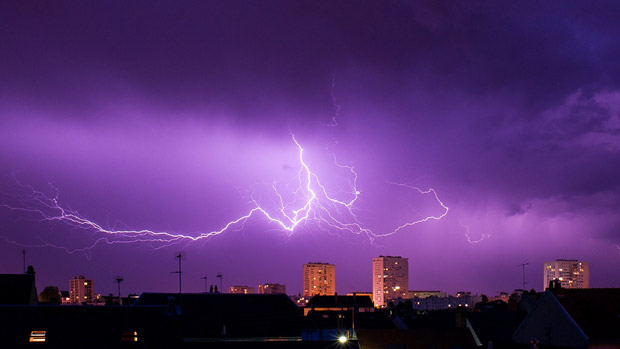Climate change: rising temperatures will lead to more lightning
Scientists say a 'small' increase in global temperatures could lead to significantly more thunder storms

A free daily email with the biggest news stories of the day – and the best features from TheWeek.com
You are now subscribed
Your newsletter sign-up was successful
Climate scientists in the US have calculated that rising global temperatures will lead to a 50 per cent increase in the number of lightning strikes hitting the ground over 100 years, the BBC reports.
David Romps, of the University of California, Berkeley, said: "For every two lightning strikes in 2000, there will be three lightning strikes in 2100." But what does that mean for the planet?
Why do rising temperatures mean more lightning?
The Week
Escape your echo chamber. Get the facts behind the news, plus analysis from multiple perspectives.

Sign up for The Week's Free Newsletters
From our morning news briefing to a weekly Good News Newsletter, get the best of The Week delivered directly to your inbox.
From our morning news briefing to a weekly Good News Newsletter, get the best of The Week delivered directly to your inbox.
While the exact cause of lightning is still uncertain, scientists know it happens when clouds filled with water and ice rise rapidly. It is heat that causes the clouds to soar - and the Berkeley team have developed a new way of calculating the relationship between available heat energy and storms.
How do they know how many lightning strikes there are now?
The US National Lightning Detector Network detects the electromagnetic pulse every lightning strike emits. The accuracy of the resulting data is "exquisite", says Romps, recording the position and timing of every bolt.
How much more lightning can we expect?
A free daily email with the biggest news stories of the day – and the best features from TheWeek.com
The team say that for every 1C rise in global temperatures, there will be an increase of 12 per cent in the frequency of lightning strikes. Between the years 2000 and 2100, therefore, they expect to see a 50 per cent rise.
How will more lightning affect us?
Half of the wildfires in the US are triggered by lightning strikes - so it is no great stretch to predict a significant rise in those. An increase in wildfires might in turn increase the rate at which the planet is warming.
What other effect might it have?
Every bolt of lightning sparks a chemical reaction which triggers a 'puff' of nitrogen oxide - one of the so-called 'greenhouse gas'. Romps says lightning is the main source of that gas in the upper and middle tropospheres.
What might more nitrogen oxide mean?
More lightning will mean more of the other greenhouse gases, including ozone and methane, as the production of nitrogen oxide indirectly regulates the quantity of those gases in the atmosphere. More greenhouse gases means more rapid global warming.
-
 The environmental cost of GLP-1s
The environmental cost of GLP-1sThe explainer Producing the drugs is a dirty process
-
 Nuuk becomes ground zero for Greenland’s diplomatic straits
Nuuk becomes ground zero for Greenland’s diplomatic straitsIN THE SPOTLIGHT A flurry of new consular activity in the remote Danish protectorate shows how important Greenland has become to Europeans’ anxiety about American imperialism
-
 ‘This is something that happens all too often’
‘This is something that happens all too often’Instant Opinion Opinion, comment and editorials of the day
-
 Epstein files topple law CEO, roil UK government
Epstein files topple law CEO, roil UK governmentSpeed Read Peter Mandelson, Britain’s former ambassador to the US, is caught up in the scandal
-
 Iran and US prepare to meet after skirmishes
Iran and US prepare to meet after skirmishesSpeed Read The incident comes amid heightened tensions in the Middle East
-
 Israel retrieves final hostage’s body from Gaza
Israel retrieves final hostage’s body from GazaSpeed Read The 24-year-old police officer was killed during the initial Hamas attack
-
 China’s Xi targets top general in growing purge
China’s Xi targets top general in growing purgeSpeed Read Zhang Youxia is being investigated over ‘grave violations’ of the law
-
 Panama and Canada are negotiating over a crucial copper mine
Panama and Canada are negotiating over a crucial copper mineIn the Spotlight Panama is set to make a final decision on the mine this summer
-
 Why Greenland’s natural resources are nearly impossible to mine
Why Greenland’s natural resources are nearly impossible to mineThe Explainer The country’s natural landscape makes the task extremely difficult
-
 Iran cuts internet as protests escalate
Iran cuts internet as protests escalateSpeed Reada Government buildings across the country have been set on fire
-
 US nabs ‘shadow’ tanker claimed by Russia
US nabs ‘shadow’ tanker claimed by RussiaSpeed Read The ship was one of two vessels seized by the US military